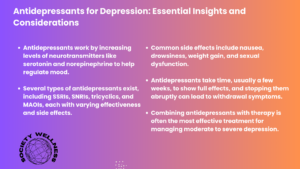Depression has become a common issue worldwide. It is defined as chronic depressive and disappointing feelings as well as a lack of interest in once-enjoyable activities. Antidepressant medicines are among the therapy choices available for depression. But how effective they are, generally depends on the severity of depression.
In this blog post, we will examine the role of antidepressants in the treatment of depression, as well as their advantages, potential side effects, and alternative treatment options.
Let’s jump in!
What Are Antidepressants?
Antidepressants are a type of medicine that is designed to treat depression and other mood disorders. They function by charging the brain’s level of specific neurotransmitters, like norepinephrine, dopamine, and serotonin, which are essential for controlling motivation, mood, and emotional response.
Here are the types of Antidepressants recommended by the doctors:
-
Selective Serotonin Reuptake Inhibitors
SSRIs are the most frequently prescribed antidepressants because they have fewer side effects than other antidepressants. Additionally, an overdose is less likely to be dangerous. The most well-known SSRI is fluoxetine and other SSRIs include sertraline Lustral, paroxetine Seroxa), citalopram Cipramil, and escitalopram.
-
Serotonin-norepinephrine reuptake Inhibitors
Compared to SSRIs, SNRIs are intended to be a more potent antidepressant. There appears to be a difference in the effectiveness for different individuals. SNRIs include venlafaxine Efexor and duloxetine Cymbalta and Yentreve.
-
Tricyclic Antidepressants
Tricyclic is an older medicine and they are no longer recommended since they can be more harmful if an overdose is taken. In comparison to SSRIs and SNRIs, they also have more unpleasant side effects.
-
Monoamine Oxidase Inhibitors
These days, MAOIs, an older class of antidepressants, are hardly ever utilized. They should only be recommended by a specialized physician due to the possibility of major side effects. Tranylcypromine, phenelzine, and isocarboxazid are a few examples of MAOIs.

How Does Antidepressants Work?
Antidepressants function by modifying the brain’s neurotransmitter levels, which enhance mood, motivation, and emotional reactivity. The specific mode of action differs based on the kind of antidepressant, but in general, they
- Elevate neurotransmitter levels: Antidepressants raise the brain’s concentrations of serotonin, norepinephrine, and dopamine, which helps elevate motivation and mood.
- Block reuptake: Antidepressants prevent brain cells from reabsorbing neurotransmitters, extending their half-lives in the synaptic cleft and boosting their efficacy.
- Boost neurotransmitter activity: Antidepressants can boost neurotransmitter activity, increasing neurotransmitters’ capacity to carry messages between brain cells.
How Effective Are Antidepressants?
Antidepressants may be beneficial for those with moderate to severe depression. However, for mild depression, they are often not advised unless all other therapies, such as talking therapy, have failed.
What are the Benefits of Antidepressants?
- Symptom Relief: Antidepressants have been shown to dramatically lessen depressive symptoms in a large number of patients, including feelings of melancholy, hopelessness, and disinterest in activities.
- Better Functioning: Antidepressants can help people restore their capacity to function in daily life by reducing symptoms.
- Supplementary to Therapy: People who take antidepressants may find it easier to participate fully in therapy sessions or depression treatment programs and to experience the benefits of psychotherapy since their symptoms may be lessened.
- Relapse Prevention: For some people, continuing antidepressant medication helps shield them from experiencing depressive episodes again.
What are the potential side effects associated with antidepressants?
Antidepressants have the potential to have several negative effects in addition to their possible benefits, such as:
- Antidepressants, particularly in the early phases of treatment, can upset the stomach and result in vomiting and nausea.
- Antidepressants may make you tired and drowsy, which can interfere with your everyday tasks.
- Individuals who are depressed may find it concerning that certain antidepressants lead to weight gain.
- Erectile dysfunction and decreased libido are two examples of sexual dysfunction that antidepressants can induce.
Join the Depression Treatment Program at Society Wellness
If you are suffering from depression or looking for a way to get rid of it naturally, consider joining our depression treatment program which is followed by experts. To fully understand the biological, psychological, and social elements that might be causing your depression, Society Wellness team adopts a comprehensive approach. We assess your unique requirements and provide a personalized addiction treatment program. Give us a call (888) 598-9510 right now!
FAQs: Role of Antidepressants in Depression Treatment
How do antidepressants work?
Antidepressants primarily work by increasing the levels of neurotransmitters, such as serotonin and norepinephrine, in the brain, which can help regulate mood.
How long does it take for antidepressants to work?
It typically takes several weeks for antidepressants to reach their full effect. Improvement in symptoms may start to appear within a few weeks, but it can take longer for some people.
Are there different types of antidepressants?
Yes, there are several classes of antidepressants, including SSRIs, SNRIs, tricyclic antidepressants, and MAOIs. Your doctor will determine the best option based on your specific needs.
Are there serious side effects to be aware of?
While rare, some serious side effects can occur. It’s important to monitor for symptoms like increased anxiety, agitation, or suicidal thoughts.
Can I stop taking antidepressants suddenly?
No, it’s essential to taper off antidepressants gradually under the guidance of your doctor to avoid withdrawal symptoms.
Can I combine antidepressants with therapy?
Yes, combining medication with therapy often leads to better outcomes.
Can lifestyle changes replace antidepressants?
While lifestyle changes are important, they may not be sufficient for severe depression. A combination of medication and therapy is often recommended.
